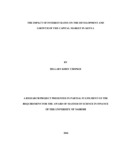| dc.description.abstract | Studies on the relationship between interest rates and their effects on various sectors of the economy have most often concentrated on the banking sector and to a lesser extent reach out on borrowing of the non-bank sectors, generally leaving the development of the capital markets out as a third crucial wellspring of outside fund, venture and a specialist of financial development. The capital markets assume critical parts in the financial development of a nation. The part of obligation in advancing financial and capital market development in Kenya has been the subject of much open deliberation among business analysts, advancement authorities and specialists. Notwithstanding this, there has just been a couple of exact studies that researched the effects of interest rates on the development of the capital market in Kenya. This gap is filled by giving experimental confirmation in the study to set up the relationship between the unpredictability of interest rates and the capital market development which is also taken to be market capitalization in the study. The current study investigates the causal effects of interest rates on the development of the capital markets in Kenya utilizing information that ranges from the year 2006 to the year 2015 and setting up through causal study if a change in one of the variables causes any changes in the other variable. The time arrangement information is on market capitalization, cash supply, genuine GDP and changes in loan fees. The outcomes demonstrate that the rates of interest significantly affect the rate of development and growth of the capital market in Kenya. The results of the study infer that Kenya could improve its capital market development by viably and deliberately stimulating the directions taken by interest rates. This study concludes that the supply-driving theory of capital market development wins in Kenya amid the period under study from 2006 to 2015. It is suggested along these lines that the administrative power ought to start strategies that would improve the control of the instability of the loan fees and in addition the forecast of the adjustments in the rates. The administration and other administrative bodies, for example, the Central bank and the capital market power ought to likewise be more proactive in their reconnaissance part keeping in mind the end goal to check sharp practices which undermine trustworthiness and disintegrate financial specialists' certainty. | en_US |



